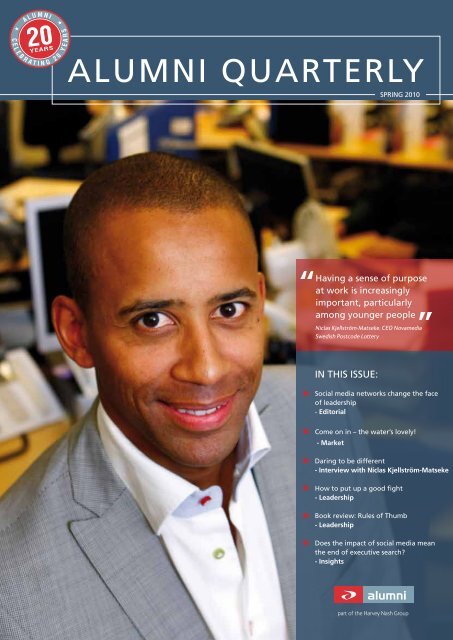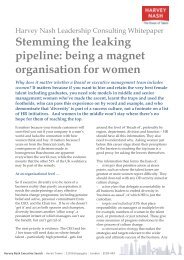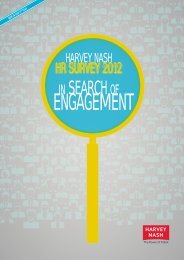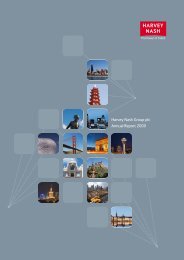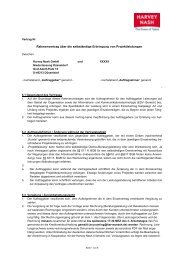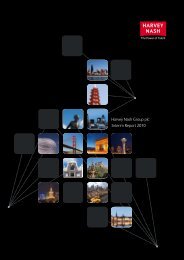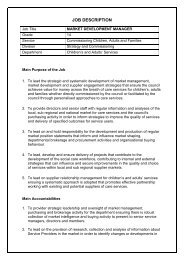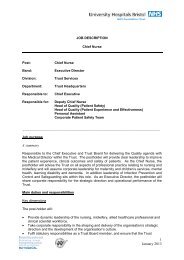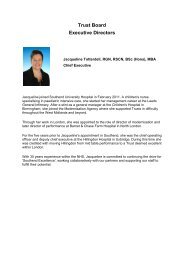ALUMNI QUARTERLY - Harvey Nash
ALUMNI QUARTERLY - Harvey Nash
ALUMNI QUARTERLY - Harvey Nash
You also want an ePaper? Increase the reach of your titles
YUMPU automatically turns print PDFs into web optimized ePapers that Google loves.
C<br />
E<br />
L<br />
E<br />
B R<br />
A L U M N<br />
A T<br />
I<br />
20<br />
YEARS<br />
I N G<br />
2<br />
S<br />
0<br />
A R<br />
E<br />
Y<br />
<strong>ALUMNI</strong> <strong>QUARTERLY</strong><br />
SPRING 2010<br />
1<br />
Having a sense of purpose<br />
at work is increasingly<br />
important, particularly<br />
among younger people<br />
Niclas Kjellström-Matseke, CEO Novamedia<br />
Swedish Postcode Lottery<br />
IN THIS ISSUE:<br />
Social media networks change the face<br />
of leadership<br />
- Editorial<br />
Come on in – the water’s lovely!<br />
- Market<br />
Daring to be different<br />
- Interview with Niclas Kjellström-Matseke<br />
How to put up a good fight<br />
- Leadership<br />
Book review: Rules of Thumb<br />
- Leadership<br />
Does the impact of social media mean<br />
the end of executive search?<br />
- Insights<br />
part of the <strong>Harvey</strong> <strong>Nash</strong> Group
2 E D I T O R I A L<br />
Social media networks change<br />
the face of leadership<br />
From our very beginnings, human beings have depended for their survival on their sense of<br />
community, their emotional fulfilment centring on their interactions with others. Such interactions<br />
fill the emotional void of solitude, provide security, nurture their egos and often provide a reason<br />
for existing.<br />
In the past, leaders didn’t really take the time to nurture competence and a sense of selfworth.<br />
More recently, however, the best leaders have provided security, guidance, vision and the<br />
opportunity to be part of a group that provides its members with a sense of ‘purpose’. Work gave<br />
us a sense of identity, worth and community that fulfilled many of our emotional needs. Work had<br />
a ‘higher purpose’ – as well as providing an income, it also enriched us by helping give us a sense<br />
of who we were and how we fitted into a bigger picture. It was even a place where we could find<br />
solutions to our problems. Work, in short, was a social network.<br />
But that concept of work – along with traditional leadership styles – is being challenged in<br />
the age of social media networks. Nowadays, people of all ages are fulfilling many of their social<br />
and emotional needs through social media networks such as Facebook. Social and emotional<br />
gratification is now available at the click of a mouse when and where people need it.<br />
Because we no longer rely on our employers to provide the things we need to create a<br />
balanced psychology, we are looking for something more from them. Our expectations are higher:<br />
what we would have settled for five years ago just won’t do today. If employers don’t meet that<br />
challenge, then employees can reveal their ‘failings’ to all and sundry on Facebook.<br />
How can leaders meet these new expectations from their people in an age of quick social<br />
fixes? They still need to provide security, guidance, vision and a sense of purpose, but they need to<br />
think harder about how they do it.<br />
Leaders can only be successful in the Facebook era by embracing the new patterns and<br />
seeing them as an opportunity rather than a threat. There are huge opportunities in the fact, for<br />
example, that employees can now interact with so many people so quickly, and that they can get<br />
information and analysis quicker than their bosses. And the very fact that employees have higher<br />
expectations of their leaders in terms of creating something that social media can’t is in itself an<br />
opportunity.<br />
So leaders need to be even clearer about their vision and strategy. They need to create an<br />
environment where employees feel inspired, challenged and that they are working towards a<br />
goal that is exciting and worth fighting for. If they succeed, their success will be shared across<br />
the social network community, with positive repercussions for employees, for leaders and for the<br />
organisation as a whole.<br />
About Alumni<br />
Alumni is the largest and most innovative<br />
consultancy within executive search and<br />
leadership services in the Nordic region. For<br />
20 years we have developed tools and services<br />
to strengthen organisations.<br />
Our clients are found throughout the<br />
private and public sector. Through a service<br />
offering ranging from executive search and<br />
management audits to people management<br />
and board services, we help create business<br />
success.<br />
We have offices in Stockholm, Gothenburg,<br />
Malmö, Copenhagen, Helsinki and Warsaw.<br />
Internationally we operate through our owner<br />
<strong>Harvey</strong> <strong>Nash</strong> with 4000 employees in 35 offices<br />
in Europe, US and Asia.<br />
Magnus Tegborg<br />
CEO Alumni and MD <strong>Harvey</strong> <strong>Nash</strong> Nordic<br />
Contact information for Alumni AB:<br />
HQ Stockholm: +46 (0)8 796 1700<br />
Gothenburg: +46 31 60 42 90<br />
Malmö: +46 40 35 48 70<br />
Copenhagen: +45 77 99 32 60<br />
Helsinki: +358 40 727 9727<br />
Warsaw: +48 22 428 47 28<br />
www.alumni.se | alumni@alumni.se<br />
For queries regarding Alumni Quarterly:<br />
Natasha Pantic: natasha.pantic@alumni.se<br />
Content must not be copied, distributed or sold without<br />
permission.
M a r k e t<br />
3<br />
Come on in - the water’s lovely!<br />
Companies that embrace social media networking may reap benefits that go beyond pure marketing, says Pernilla Jonsson<br />
While social networking media such as<br />
Facebook, Flickr and YouTube have gained<br />
huge popularity among individuals seeking<br />
to connect with each other, the considerable<br />
benefits to businesses of engaging with<br />
such media are only just beginning to be<br />
understood.<br />
So far, most businesses have only just<br />
dipped their toe in the water. They might have<br />
a budget, but really don’t know where to start.<br />
So the typical approach is to set up a Facebook<br />
page. But that’s going about things the wrong<br />
way. You shouldn’t establish a social presence<br />
until you are clear what you want to do with it.<br />
The first question a company should ask<br />
itself is what it wants to achieve through social<br />
networking. And to answer that, it needs to<br />
revisit the goals outlined in its marketing plan<br />
and try to determine whether it could achieve<br />
those more effectively through social media or,<br />
indeed, if there are groups of consumers whom<br />
it doesn’t reach through traditional channels<br />
that it could reach through social media.<br />
Most companies have not yet realised what<br />
a fantastic source of consumer insight social<br />
media represent. But to properly harness those<br />
insights you need to do the right qualitative<br />
and quantitative analysis.<br />
The first step is to establish where your<br />
customers and potential customers are in the<br />
social media landscape. To do that you need to<br />
conduct a thorough analysis of social media,<br />
focusing specifically on consumers’ interests<br />
and opinions in areas affecting the climate in<br />
which your business operates.<br />
So the analysis should include consumer<br />
views on your own brand or organisation, on<br />
your own and parallel markets, and on broader<br />
societal trends affecting your brand and<br />
market.<br />
Gaining such insights into consumers and<br />
their culture allows organisations to shape and<br />
mould their communications accordingly. But<br />
you might have to be prepared to completely<br />
rethink your proposition, because such an<br />
unadulterated consumer interpretation of<br />
your brand could be at odds with your own<br />
perception of it. You might even find you have<br />
invested a great deal in a proposition that is<br />
not relevant at all.<br />
But armed with this rich source of<br />
consumer insight, you can start to work out<br />
how to add value to your target consumers in<br />
a way that makes them want to engage with<br />
you and buy your products and services. But<br />
Pernilla Jonsson<br />
Pernilla Jonsson is head<br />
of the consumer, markets<br />
and innovation division<br />
at Kairos Future. The<br />
company has developed<br />
a tool called Social Media<br />
Mapping, which combines<br />
quantitative and qualitative<br />
ethnographic analysis<br />
of social media. For<br />
more information go to<br />
kairosfuture.com<br />
Most companies<br />
have not yet realised<br />
what a fantastic<br />
source of consumer<br />
insight social media<br />
represent<br />
marketing through social networking media<br />
is very different from marketing through<br />
traditional mass-market media, whether abovethe-line<br />
advertising or direct mail, both of<br />
which depend, to a large extent, on ‘nagging’<br />
their way into the consumer consciousness.<br />
By contrast, the trick with social networking<br />
media is to have a sufficiently engaging<br />
message that the people you are targeting<br />
seek you out, and are willing to disseminate<br />
the message to others. The exemplar of that<br />
approach was President Obama’s election<br />
campaign, which harnessed the full potential<br />
of the internet to involve voters from the grass<br />
roots up in a collective ‘co-created’ endeavour<br />
to bring about change – ‘Yes, we can!’.<br />
But one of the greatest barriers to<br />
companies’ ability to exploit the power of<br />
social networking media is fear about the<br />
negative things consumers might say about<br />
them, and the sense that they will lose control<br />
over their brand and communications. But<br />
negative word-of-mouth has always gone<br />
on: the difference with social media is that<br />
companies can actually see exactly what<br />
consumers think about them and, if they are<br />
wise, act on it.<br />
This can be quite challenging, particularly<br />
for organisations with strict, policy- and<br />
procedure-driven corporate cultures. However,<br />
companies that meet that challenge head on<br />
may reap considerable benefits that go beyond<br />
‘marketing’. New research shows that 80 per<br />
cent of consumers across the world want<br />
companies to show a more human face and to<br />
be, and act, in a more authentic manner.<br />
No company can ever be perfect, however<br />
hard it tries, but consumers respect those that<br />
try – and showing more humility, admitting to<br />
mistakes and attempting to put things right<br />
are obvious ways to demonstrate that they<br />
are trying. In many cases, that will require<br />
organisations to adapt or completely change<br />
their corporate culture.<br />
So if you are about to dip your toe in<br />
the water, but are slightly nervous about the<br />
temperature, come on in – the water’s lovely!<br />
------------------------------------------------------<br />
Jane Simms is a freelance writer and editor.
4 I N T E R V I E W<br />
Daring to be different<br />
After ten years as a strategy consultant, Niclas Kjellström-Matseke discovered the latent entrepreneur inside himself when<br />
he gave momentum to the Swedish Postcode Lottery, a pioneer of ‘market-driven charity’. You can adapt and change your<br />
leadership style, he tells Alumni Quarterly, if you are willing to learn from others.<br />
NICLAS KJELLSTRÖM-MATSEKE<br />
Niclas Kjellström-Matseke is CEO of<br />
Novamedia Swedish Postcode Lottery,<br />
and a pioneer of ‘market-driven charity’,<br />
an approach that uses commercial means<br />
to generate sustainable funding for good<br />
causes. The organisation makes money<br />
from ‘doing well’ and ‘doing good’ at the<br />
same time. The owners make a profit<br />
– around four per cent of turnover; the<br />
beneficiaries receive about 27 per cent<br />
of turnover; and all the principles in the<br />
company – not least employing highquality<br />
people and providing a highquality<br />
service and being prepared to pay<br />
for it – are commercial.<br />
The Swedish Postcode Lottery has<br />
become increasingly popular with the<br />
Swedes since it was set up in September<br />
2005. It has already donated 1 billion SEK<br />
(€900 million) to good causes, including<br />
WWF, UNICEF, Médécins sans Frontières,<br />
the Clinton Climate Initiative and<br />
Amnesty International. It aims to donate<br />
1 billion SEK a year.<br />
Kjellström-Matseke, who is 39,<br />
previously held senior management<br />
positions in companies including Alumni<br />
and Accenture, and was CEO of Spero,<br />
another Swedish lottery. He has MBAs<br />
from Stockholm School of Economics<br />
and Babson College in the US, as well<br />
as a degree in economics from Uppsala<br />
University and training from The Swedish<br />
Coastal Rangers.<br />
AQ: You have pioneered the concept of<br />
‘market-driven charity’ in Sweden. What<br />
kind of leadership is required to make<br />
a success of such an innovative new<br />
approach?<br />
Niclas Kjellström-Matseke: When we set<br />
up this organisation, we went into the market<br />
on the commercial platform – the lottery –<br />
and took an aggressive approach to gaining<br />
market share. We deliberately played down<br />
the ‘philanthropic’ side of what we wanted to<br />
do, knowing that most people would find the<br />
combination of commercial and charitable<br />
aims difficult to fathom.<br />
We only started to communicate our<br />
charitable ethos – sustainable fund-raising<br />
for good causes – at the end of the first year,<br />
when we were able to hand out some money –<br />
61 million Swedish Krona (SEK).<br />
Having a sense of<br />
‘purpose’ at work<br />
is increasingly<br />
important,<br />
particularly among<br />
younger people<br />
So the initial challenge was primarily a<br />
business challenge because, as for any business,<br />
the tough part was to create profit. But to grow<br />
as fast as we wanted to, I needed other leaders<br />
around me, who were equally committed to<br />
what we were trying to do. People generally<br />
were looking for us to trip up, for signs that we<br />
wouldn’t be able to achieve our vision. So you<br />
need to be determined, and committed, and<br />
enjoy the ride, because you are going to lose<br />
battles along the way.<br />
My background is management<br />
consultancy – I spent ten years in this field<br />
as a strategy consultant. But when launching<br />
this venture, I behaved much more like an<br />
entrepreneur. I didn’t do the greatest strategic<br />
work, nor had the clearest vision about how to<br />
do things, nor had the most excellent system,
I N T E R V I E W<br />
5<br />
structure and processes. Our strength was our<br />
determination to keep going and to learn from<br />
our mistakes. I can look back now and pretend<br />
that that was our strategy, but in reality we<br />
were opportunistic. You burn your fingers, but<br />
you have another go. We were addicted to<br />
investigating opportunities, and it was fun.<br />
I didn’t exactly leave my strategic<br />
analytical background behind me, but I didn’t<br />
need it during that first year: what I needed<br />
was determination, commitment, focus and<br />
pragmatism. We were ‘results junkies’, happy<br />
to ask for and take advice on how to reach our<br />
goal rather than being proud or concerned with<br />
prestige.<br />
What sort of people do you need to<br />
work with you in such an environment,<br />
and how do you motivate them?<br />
Some people find it frustrating when you keep<br />
changing your focus – whether because of<br />
legislation, or because things aren’t working.<br />
When setting up something completely new<br />
like this, you go down blind alleys, and have to<br />
backtrack and redouble your effort, and you<br />
need people around you who feel comfortable<br />
with working in the same way.<br />
I have always had one or two people close<br />
to me, who are older and more mature, and<br />
who act as a check and balance on what I do<br />
as the ‘visionary’ leader. I consciously recruit<br />
people who are excellent at that, and finding<br />
great people is one of the few things I am really<br />
decent at.<br />
In the beginning it was relatively difficult<br />
to attract employees – on the face of it there<br />
was nothing very different or ‘sexy’ about<br />
us. But that changed when we launched the<br />
concept of ‘market-driven charity’, and we<br />
now appeal equally to individuals from top<br />
consultancy firms and those from social<br />
services backgrounds.<br />
We are much closer in structure and ethos<br />
to a traditional corporation than we are to a<br />
non-government organisation (NGO) or charity,<br />
but having said that, people are motivated by<br />
being able to ‘do well’ and ‘do good’ at the<br />
same time. Indeed, having a sense of ‘purpose’<br />
at work is increasingly important, particularly<br />
among younger people, and being able to<br />
offer them that is a differentiating factor for an<br />
employer.<br />
Many companies are adjusting to this<br />
new reality. For example, Accenture, one of<br />
my former employers, is increasingly building<br />
opportunities for its staff to get involved in<br />
voluntary work and is supporting them to<br />
do so. We are lucky: we have built it into our<br />
business model. NGOs visit us on a weekly<br />
basis to discuss world challenges, and we take<br />
our employees out into the real world to see<br />
how the money donated through the lottery<br />
is being used. Employees – whether a chief<br />
financial officer or customer services agent –<br />
are motivated by seeing the work they do in a<br />
bigger social context.<br />
I have always had<br />
one or two people<br />
close to me, who<br />
are older and more<br />
mature, and who<br />
act as a check and<br />
balance on what I<br />
do as the ‘visionary’<br />
leader<br />
How have you adapted your leadership<br />
style as the company has grown?<br />
As the organisation grows you have to become<br />
more structured and organised and better<br />
adapted to policy making and managing risk<br />
and so on. We are going through that now<br />
and it can be a bit painful. It is very different<br />
from the entrepreneurial work we did at<br />
the beginning, and it can pose a leadership<br />
challenge. Some people find it impossible<br />
to adapt their leadership style, and ought,<br />
arguably, to move on. Others, meanwhile,<br />
seem too keen to move on when, in fact, they<br />
could learn and develop through tackling the<br />
challenges inherent in growth.<br />
We have had a series of huge challenges<br />
here at every stage of our growth for the past<br />
five years, and throughout it all I have had to<br />
go back to school and educate myself in order<br />
to keep up. I am back at Stockholm School<br />
of Economics at the moment. I did a Masters<br />
in social sciences and economics in the early<br />
1990s, and an executive MBA ten years later.<br />
Now I am taking courses on professional board<br />
work. That’s additional to the day job and is, in<br />
itself, a challenge.<br />
You can grow with the company, if you are<br />
prepared to. It is lots of fun, and it gives you<br />
great opportunities to look outside the box<br />
rather than doing the same thing over and over<br />
again. You should also learn from the greatest<br />
advisers you can imagine. I made a list of the<br />
greatest Swedes in business, NGOs, politics<br />
and so on – some active, some retired – and<br />
approached them for help. Some responded<br />
and some didn’t. I also made a list of all the<br />
great leaders in the world: you don’t have to<br />
speak to them, but you can learn from what<br />
they have done.<br />
Among the leaders you have met, who<br />
has been the most inspirational, and<br />
why?<br />
I’ve not met Bill Gates, but I admire him<br />
for innovating early in his career, for<br />
continually stepping outside the box and<br />
doing unexpected things, and now for his<br />
philanthropy – eliminating malaria, as he wants<br />
to, would be an amazing achievement.<br />
I have met Bill Clinton, Nelson Mandela<br />
and Tony Blair, and you get different things<br />
from each of them. Mandela’s approach,<br />
for example, is to stand back and let people<br />
understand how they should behave, rather<br />
than telling them – a sort of coaching<br />
approach, if you like. Blair, by contrast, is more<br />
direct, but his leadership gift is that people feel<br />
totally comfortable and relaxed in his presence.<br />
But what unites all the leaders I most admire<br />
is that they make everyone else feel that they<br />
count equally and can contribute to making<br />
things better.<br />
How do you balance your high-profile<br />
external persona with your internal<br />
leadership role?<br />
It’s difficult, and I don’t think that I often<br />
successfully do both simultaneously. Employees<br />
aren’t necessarily motivated by the external<br />
role I play: they would rather participate<br />
themselves, I believe, by going on field trips,<br />
meeting inspiring people, great NGOs and<br />
so on. I am aware that I need to work on<br />
that, but I do have this hand-picked team of<br />
brilliant individuals who can step in and provide<br />
leadership when I am out of the organisation.<br />
------------------------------------------------------<br />
Jane Simms is a freelance writer and editor.
6 L e a d e r s h i p<br />
How to put up a good fight<br />
Don’t mistake a lack of open conflict for agreement, warns Richard Brown<br />
How well do you deal with challenge? If we’re<br />
honest, most of us handle it poorly – it’s a<br />
hard-wired human response to a sense that our<br />
authority or credibility is being questioned. But<br />
business leaders probably handle it worst than<br />
most, because they fear appearing indecisive or<br />
losing control. So the tendency is to snuff out<br />
flickers of challenge to the point where no one<br />
dare contradict you.<br />
That’s a far from healthy state of affairs,<br />
particularly if you mistake a lack of open<br />
conflict for agreement and alignment.<br />
Anger and table thumping may prove more<br />
productive than withdrawal, passivity or<br />
sullen ‘acceptance’, because people can take<br />
their misgivings underground and spread<br />
them through the organisation. That has an<br />
insidious effect on morale, performance and<br />
productivity.<br />
Our recent research among over 3,500<br />
top, senior and mid-level managers in public<br />
and private-sector organisations indicated that<br />
firms that encourage, embrace and manage<br />
challenge make far better strategic decisions<br />
and generate far better understanding of and<br />
buy-in to those decisions than firms that don’t.<br />
There are three main reasons.<br />
1. The best decisions take account of a range<br />
of different views and perspectives.<br />
2. If people challenge it means they are<br />
involved, and are therefore likely to be<br />
more committed to the outcome of a<br />
discussion, even if they aren’t in complete<br />
agreement.<br />
3. Well-managed challenge brings differences<br />
out into the open, helps prevent the kind<br />
of collusion where individuals agree to<br />
protect each other’s backs and overrides<br />
the reluctance to upset someone that<br />
prevents some people speaking out.<br />
But while most managers understand this at a<br />
rational level,<br />
• fewer than 50 per cent of managers we<br />
surveyed said their organisations actively<br />
encourage challenge<br />
• 25 per cent said they discourage it<br />
• just 10 per cent said challenge happens ‘a<br />
lot’ in their organisation<br />
• where there is challenge, 60 per cent of<br />
respondents said the challengers are often<br />
labelled ‘troublemakers’.<br />
Richard Brown is managing partner of Cognosis<br />
Firms that encourage,<br />
embrace and manage<br />
challenge make<br />
far better strategic<br />
decisions than those<br />
that don’t<br />
Further disturbing findings include the fact that<br />
• non-executive directors challenge strategy<br />
in only eight per cent of organisations<br />
• chairmen challenge strategy in just ten per<br />
cent of firms<br />
• HR challenges strategy in only nine per<br />
cent of firms.<br />
No wonder powerful banking chief executives<br />
felt free to pursue strategies that ultimately<br />
proved so destructive – and no wonder the<br />
people aspects of so many corporate strategies<br />
are bolted on as an afterthought rather than<br />
being treated as key to an organisation’s ability<br />
to achieve its goals.<br />
Nurturing a culture that harnesses<br />
challenge has to start at the top. If the<br />
leader and top team embrace the ‘challenge’<br />
challenge, then a culture of challenge will<br />
permeate the organisation without the need<br />
for a formal culture change programme. But<br />
ensuring the challenge is constructive and<br />
‘functional’ rather than degenerating into<br />
personal attacks, exacerbating internal politics<br />
or reinforcing personal agendas, is hard.<br />
There are several steps organisations can<br />
take to foster functional conflict.<br />
• Ensure the leadership group is ‘wholeminded’<br />
by seeking out complementary<br />
styles, personalities and approaches when<br />
hiring.<br />
• When developing strategy, involve as<br />
many representative voices as possible,<br />
particularly in the early stages. Even<br />
someone saying they don’t understand<br />
something can be extremely valuable.<br />
• However, make it clear that everyone must<br />
support the ultimate decision, even though<br />
they might have preferred a different one.<br />
While boards and leadership teams may be able<br />
to manage their own challenge processes, it<br />
sometimes requires a more impartial observer<br />
to pose the really challenging questions – not<br />
‘how can we do this better, faster or more<br />
cheaply?’ but ‘why are we doing this at all?’ Only<br />
when you delve deep do you get the insights<br />
that are real gold-dust.<br />
------------------------------------------------------<br />
Jane Simms is a freelance writer and editor.
L e a d e r s h i p<br />
7<br />
Book review: Rules of Thumb: 52 truths for<br />
winning at business without losing your self<br />
Alan Webber, the co-founder of Fast Company magazine and former editorial director and managing director of the Harvard<br />
Business Review, has summarised his key learnings from over 40 years of work in sectors ranging from federal, state and local<br />
government to being an entrepreneur in the media industry.<br />
Through his work he has had interactions<br />
with some of the world’s leading thinkers and<br />
highest achievers and has created a collection<br />
of 52 ‘rules of thumb’ – lessons he has learned<br />
that can be applied to both business and<br />
personal life.<br />
Though sometimes philosophical,<br />
the lessons are also practical and easy to<br />
incorporate in everyday leadership and life. The<br />
book is very flexible in its form: you can read it<br />
from cover to cover or dip into randomly for<br />
different ideas. What is inspirational about the<br />
book is that Webber draws the lessons from all<br />
sectors and geographies and gives the reader<br />
new perspectives on everyday issues. In today’s<br />
world of dramatic change where you can’t take<br />
anything for granted, you need to sort out the<br />
new rules of the game before working out how<br />
to win the game.<br />
The examples below give a flavour of the<br />
range of lessons in the book.<br />
• The way to succeed in business is by having<br />
serious fun. People rarely prosper when<br />
not having fun and strategic work is all<br />
about looking for ideas and focusing on<br />
opportunities rather than realities<br />
• Everything conveys a message – your office<br />
space, your web site, what you wear, how<br />
you act, what you do and don’t do. So be<br />
clear about what your values are and what<br />
you want to communicate, and let that<br />
inform all your actions.<br />
• The soft issues are really the hard ones.<br />
The two most influential management<br />
books in terms of popularity and impact<br />
(In Search of Excellence, Tom Peters<br />
and Bob Waterman, 1982; Good to<br />
Great, Jim Collins, 2001) both come to<br />
the same conclusion: fantastic people<br />
create fantastic companies delivering<br />
extraordinary financial results. The<br />
equation doesn’t work the other way<br />
round.<br />
------------------------------------------------------<br />
Åsa Idlund, Manager of Development and<br />
Operations, Alumni Nordic<br />
Fantastic people<br />
create fantastic<br />
companies<br />
delivering<br />
extraordinary<br />
financial results
8 I N S I G H T S<br />
Does the impact of social media mean the<br />
end of executive search?<br />
The growth of social media networking has<br />
dramatically enhanced the ability to identify,<br />
connect with and maintain a wide and active<br />
network. Even when approaching candidates<br />
at senior executive levels, a quick online<br />
search will help you identify almost everyone<br />
that could be of interest to you. You can also<br />
find relevant and detailed personal, as well<br />
as professional, information about potential<br />
candidates online, not least through sites such<br />
as Twitter and Facebook and through blogs<br />
Networking opportunities are almost infinite,<br />
and sites such as LinkedIn make staying in<br />
touch and keeping your network alive much<br />
more natural than in the days when you used<br />
to have to pick up the phone every few weeks.<br />
Information overload?<br />
Because information is available to everyone,<br />
managers are more closely scrutinised than<br />
ever. Facts accessible by you as an employer<br />
are also accessible to the media, and scandals<br />
involving senior managers’ personal, financial<br />
or legal difficulties make regular media fodder.<br />
Employers need to be one step ahead and<br />
ensure they discover negative facts about<br />
potential candidates before they recruit them.<br />
The sheer volume of information available<br />
online these days creates its own challenges.<br />
For example, online information can easily be<br />
manipulated: how do you know if something<br />
is correct or not? Also, when the supply of<br />
potential candidates who appear to meet your<br />
criteria is so large, how do you choose between<br />
them? When recruiting senior executives,<br />
having too much choice can work against you.<br />
Does executive search have a future?<br />
Because social media networks have made<br />
identifying candidates so much easier, employers<br />
can concentrate instead on separating the<br />
wheat from the chaff during the selection<br />
process. To judge whether a person is right for a<br />
role means looking not just at traditional merits<br />
like competence and experience, but also at<br />
factors such as personality, motivation, health<br />
and economic background.<br />
The selection process in executive search<br />
is increasingly sophisticated, and includes<br />
everything from in-depth interviews,<br />
personality and problem-solving tests, through<br />
individual due diligence investigations and<br />
health check-ups, to deep and comprehensive<br />
reference interviews. So we believe the value<br />
we add to the recruitment process is no longer<br />
identifying a long-list of competent candidates,<br />
but thoroughly evaluating candidates in order<br />
to help clients make the best possible choice.<br />
As any senior manager knows, search is a<br />
time-consuming process, and engaging with<br />
candidates is critical to ensuring that the<br />
investment of time, energy and money yields<br />
results. In our experience, people only get<br />
involved when they are genuinely interested<br />
in the opportunity. Therefore, to establish<br />
whether a candidate is genuinely interested in<br />
a position, and to help to build that interest,<br />
the headhunter needs to nurture a professional<br />
and personal relationship with the candidate –<br />
something that is very hard to replicate online.<br />
We constantly push ourselves to improve the<br />
way we work in order to be the most trusted<br />
adviser and deliver excellent service to our<br />
clients. New online media help us as well as<br />
clients to make good recruitment decisions,<br />
but, ironically, they also make the need for a<br />
trusted adviser more important than ever.<br />
------------------------------------------------------<br />
Åsa Idlund, Manager of Development and<br />
Operations, Alumni Nordic; Christoffer Lindblad,<br />
Executive Search Manager, Alumni Nordic


